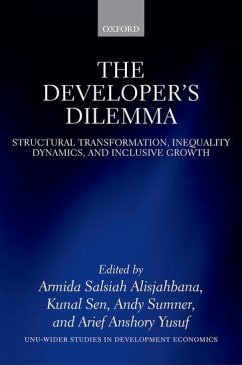The Developer's Dilemma
Structural Transformation, Inequality Dynamics, and Inclusive Growth
Herausgeber: Alisjahbana, Armida Salsiah; Yusuf, Arief; Sumner, Andy; Sen, Kunal
The Developer's Dilemma
Structural Transformation, Inequality Dynamics, and Inclusive Growth
Herausgeber: Alisjahbana, Armida Salsiah; Yusuf, Arief; Sumner, Andy; Sen, Kunal
- Gebundenes Buch
- Merkliste
- Auf die Merkliste
- Bewerten Bewerten
- Teilen
- Produkt teilen
- Produkterinnerung
- Produkterinnerung
Developing countries seek broad-based, inclusive economic development that raises the income of all, especially the poor. The Developer's Dilemma explores the tension between this aim and the hypothesis that economic development tends to put upward pressure on income inequality, at least initially and in the absence of countervailing policies.
Andere Kunden interessierten sich auch für
![The Population Dilemma The Population Dilemma]() The Population Dilemma35,99 €
The Population Dilemma35,99 €![The Dilemma of the Commoners The Dilemma of the Commoners]() Tine De MoorThe Dilemma of the Commoners108,99 €
Tine De MoorThe Dilemma of the Commoners108,99 €![The Dilemma of Siting a High-Level Nuclear Waste Repository The Dilemma of Siting a High-Level Nuclear Waste Repository]() D. EasterlingThe Dilemma of Siting a High-Level Nuclear Waste Repository115,99 €
D. EasterlingThe Dilemma of Siting a High-Level Nuclear Waste Repository115,99 €![Economic Efficiency and Political Constraints - The Dilemma of Privatization in Eastern Germany Economic Efficiency and Political Constraints - The Dilemma of Privatization in Eastern Germany]() Patrick AvatoEconomic Efficiency and Political Constraints - The Dilemma of Privatization in Eastern Germany17,95 €
Patrick AvatoEconomic Efficiency and Political Constraints - The Dilemma of Privatization in Eastern Germany17,95 €![The Federal Design Dilemma The Federal Design Dilemma]() Pamela J. Clouser MccannThe Federal Design Dilemma70,99 €
Pamela J. Clouser MccannThe Federal Design Dilemma70,99 €![Asia and the Middle-Income Trap Asia and the Middle-Income Trap]() Asia and the Middle-Income Trap211,99 €
Asia and the Middle-Income Trap211,99 €![East Asia and the Trials of Neo-Liberalism East Asia and the Trials of Neo-Liberalism]() Richard Robison / Kevin Hewison (eds.)East Asia and the Trials of Neo-Liberalism179,99 €
Richard Robison / Kevin Hewison (eds.)East Asia and the Trials of Neo-Liberalism179,99 €-
-
-
Developing countries seek broad-based, inclusive economic development that raises the income of all, especially the poor. The Developer's Dilemma explores the tension between this aim and the hypothesis that economic development tends to put upward pressure on income inequality, at least initially and in the absence of countervailing policies.
Hinweis: Dieser Artikel kann nur an eine deutsche Lieferadresse ausgeliefert werden.
Hinweis: Dieser Artikel kann nur an eine deutsche Lieferadresse ausgeliefert werden.
Produktdetails
- Produktdetails
- Verlag: Hurst & Co.
- Seitenzahl: 326
- Erscheinungstermin: 2. November 2022
- Englisch
- Abmessung: 226mm x 165mm x 38mm
- Gewicht: 680g
- ISBN-13: 9780192855299
- ISBN-10: 0192855298
- Artikelnr.: 66146322
- Herstellerkennzeichnung
- Libri GmbH
- Europaallee 1
- 36244 Bad Hersfeld
- gpsr@libri.de
- Verlag: Hurst & Co.
- Seitenzahl: 326
- Erscheinungstermin: 2. November 2022
- Englisch
- Abmessung: 226mm x 165mm x 38mm
- Gewicht: 680g
- ISBN-13: 9780192855299
- ISBN-10: 0192855298
- Artikelnr.: 66146322
- Herstellerkennzeichnung
- Libri GmbH
- Europaallee 1
- 36244 Bad Hersfeld
- gpsr@libri.de
Armida Salsiah Alisjahbana is Under-secretary-general of the United Nations and Executive Secretary of ESCAP (2018-present), and Professor of Economics at Universitas Padjadjaran. Kunal Sen is Director of UNU-WIDER and Professor of Development Economics at the University of Manchester. Andy Sumner is Professor of International Development at King's College London. Arief Yusuf is Professor of Economics at Universitas Padjadjaran.
* 1: Armida Salsiah Alisjahbana, Kunal Sen, Andy Sumner, and Arief
Yusuf: The developer's dilemma
* 2: Armida Salsiah Alisjahbana, Kyunghoon Kim, Kunal Sen, Andy Sumner,
and Arief Yusuf: The developer's dilemma: A survey of structural
transformation and inequality dynamics
* Part I. East Asia
* 3: Kyunghoon Kim, Arriya Mungsunti, Andy Sumner, and Arief Yusuf:
Structural transformation and inclusive growth: Kuznets' 'developer's
dilemma' in Indonesia
* 4: Yanan Li and Chunbing Xing: Getting rich and unequal? Structural
transformation, inequality, and inclusive growth in China
* 5: Peter Warr and Waleerat Suphannachart: Benign growth: Structural
transformation and inclusive growth in Thailand
* Part II. South Asia
* 6: Saon Ray and Sabyasachi Kar: Inclusive structural transformation
in India: Past episodes and future trajectories
* 7: Selim Raihan and Sunera Saba Khan: The challenges of structural
transformation, inequality dynamics, and inclusive growth in
Bangladesh
* Part III. Sub-Saharan Africa
* 8: Robert Darko Osei, Richmond Atta-Ankomah, and Monica
Lambon-Quayefio: Adverse political settlements: An impediment to
structural transformation and inclusive growth in Ghana
* 9: Haroon Bhorat, Kezia Lilenstein, Morné Oosthuizen, François
Steenkamp, and Amy Thornton: Economic growth, rising inequality, and
de-industrialization: South Africa's Kuznetsian tension
* Part IV. Latin America
* 10: Sergio Firpo, Renan Pieri, and Rafaela Nogueira: Inclusive growth
without structural transformation? The case of Brazil
* 11: Andres Solimano and Gabriela Zapata-Román: Structural
transformations and the lack of inclusive growth: The case of Chile
* Part V. Looking Ahead
* 12: Lukas Schlogl: Leapfrogging into the unknown: The future of
structural change in the developing world
* 13: Armida Salsiah Alisjahbana, Kunal Sen, Andy Sumner, and Arief
Yusuf: The developer's dilemma: Conclusions
Yusuf: The developer's dilemma
* 2: Armida Salsiah Alisjahbana, Kyunghoon Kim, Kunal Sen, Andy Sumner,
and Arief Yusuf: The developer's dilemma: A survey of structural
transformation and inequality dynamics
* Part I. East Asia
* 3: Kyunghoon Kim, Arriya Mungsunti, Andy Sumner, and Arief Yusuf:
Structural transformation and inclusive growth: Kuznets' 'developer's
dilemma' in Indonesia
* 4: Yanan Li and Chunbing Xing: Getting rich and unequal? Structural
transformation, inequality, and inclusive growth in China
* 5: Peter Warr and Waleerat Suphannachart: Benign growth: Structural
transformation and inclusive growth in Thailand
* Part II. South Asia
* 6: Saon Ray and Sabyasachi Kar: Inclusive structural transformation
in India: Past episodes and future trajectories
* 7: Selim Raihan and Sunera Saba Khan: The challenges of structural
transformation, inequality dynamics, and inclusive growth in
Bangladesh
* Part III. Sub-Saharan Africa
* 8: Robert Darko Osei, Richmond Atta-Ankomah, and Monica
Lambon-Quayefio: Adverse political settlements: An impediment to
structural transformation and inclusive growth in Ghana
* 9: Haroon Bhorat, Kezia Lilenstein, Morné Oosthuizen, François
Steenkamp, and Amy Thornton: Economic growth, rising inequality, and
de-industrialization: South Africa's Kuznetsian tension
* Part IV. Latin America
* 10: Sergio Firpo, Renan Pieri, and Rafaela Nogueira: Inclusive growth
without structural transformation? The case of Brazil
* 11: Andres Solimano and Gabriela Zapata-Román: Structural
transformations and the lack of inclusive growth: The case of Chile
* Part V. Looking Ahead
* 12: Lukas Schlogl: Leapfrogging into the unknown: The future of
structural change in the developing world
* 13: Armida Salsiah Alisjahbana, Kunal Sen, Andy Sumner, and Arief
Yusuf: The developer's dilemma: Conclusions
* 1: Armida Salsiah Alisjahbana, Kunal Sen, Andy Sumner, and Arief
Yusuf: The developer's dilemma
* 2: Armida Salsiah Alisjahbana, Kyunghoon Kim, Kunal Sen, Andy Sumner,
and Arief Yusuf: The developer's dilemma: A survey of structural
transformation and inequality dynamics
* Part I. East Asia
* 3: Kyunghoon Kim, Arriya Mungsunti, Andy Sumner, and Arief Yusuf:
Structural transformation and inclusive growth: Kuznets' 'developer's
dilemma' in Indonesia
* 4: Yanan Li and Chunbing Xing: Getting rich and unequal? Structural
transformation, inequality, and inclusive growth in China
* 5: Peter Warr and Waleerat Suphannachart: Benign growth: Structural
transformation and inclusive growth in Thailand
* Part II. South Asia
* 6: Saon Ray and Sabyasachi Kar: Inclusive structural transformation
in India: Past episodes and future trajectories
* 7: Selim Raihan and Sunera Saba Khan: The challenges of structural
transformation, inequality dynamics, and inclusive growth in
Bangladesh
* Part III. Sub-Saharan Africa
* 8: Robert Darko Osei, Richmond Atta-Ankomah, and Monica
Lambon-Quayefio: Adverse political settlements: An impediment to
structural transformation and inclusive growth in Ghana
* 9: Haroon Bhorat, Kezia Lilenstein, Morné Oosthuizen, François
Steenkamp, and Amy Thornton: Economic growth, rising inequality, and
de-industrialization: South Africa's Kuznetsian tension
* Part IV. Latin America
* 10: Sergio Firpo, Renan Pieri, and Rafaela Nogueira: Inclusive growth
without structural transformation? The case of Brazil
* 11: Andres Solimano and Gabriela Zapata-Román: Structural
transformations and the lack of inclusive growth: The case of Chile
* Part V. Looking Ahead
* 12: Lukas Schlogl: Leapfrogging into the unknown: The future of
structural change in the developing world
* 13: Armida Salsiah Alisjahbana, Kunal Sen, Andy Sumner, and Arief
Yusuf: The developer's dilemma: Conclusions
Yusuf: The developer's dilemma
* 2: Armida Salsiah Alisjahbana, Kyunghoon Kim, Kunal Sen, Andy Sumner,
and Arief Yusuf: The developer's dilemma: A survey of structural
transformation and inequality dynamics
* Part I. East Asia
* 3: Kyunghoon Kim, Arriya Mungsunti, Andy Sumner, and Arief Yusuf:
Structural transformation and inclusive growth: Kuznets' 'developer's
dilemma' in Indonesia
* 4: Yanan Li and Chunbing Xing: Getting rich and unequal? Structural
transformation, inequality, and inclusive growth in China
* 5: Peter Warr and Waleerat Suphannachart: Benign growth: Structural
transformation and inclusive growth in Thailand
* Part II. South Asia
* 6: Saon Ray and Sabyasachi Kar: Inclusive structural transformation
in India: Past episodes and future trajectories
* 7: Selim Raihan and Sunera Saba Khan: The challenges of structural
transformation, inequality dynamics, and inclusive growth in
Bangladesh
* Part III. Sub-Saharan Africa
* 8: Robert Darko Osei, Richmond Atta-Ankomah, and Monica
Lambon-Quayefio: Adverse political settlements: An impediment to
structural transformation and inclusive growth in Ghana
* 9: Haroon Bhorat, Kezia Lilenstein, Morné Oosthuizen, François
Steenkamp, and Amy Thornton: Economic growth, rising inequality, and
de-industrialization: South Africa's Kuznetsian tension
* Part IV. Latin America
* 10: Sergio Firpo, Renan Pieri, and Rafaela Nogueira: Inclusive growth
without structural transformation? The case of Brazil
* 11: Andres Solimano and Gabriela Zapata-Román: Structural
transformations and the lack of inclusive growth: The case of Chile
* Part V. Looking Ahead
* 12: Lukas Schlogl: Leapfrogging into the unknown: The future of
structural change in the developing world
* 13: Armida Salsiah Alisjahbana, Kunal Sen, Andy Sumner, and Arief
Yusuf: The developer's dilemma: Conclusions








